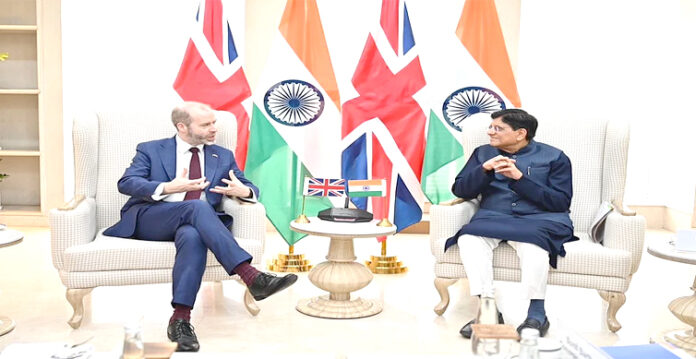The proposed Free Trade Agreement (FTA) between India and the United Kingdom has the potential to transform the bilateral relationship between the two nations, offering a roadmap to an era of enhanced trade, investment, and cooperation. The resumption of negotiations, after an eight-month hiatus, has sparked hope for a mutually beneficial partnership that promises significant economic gains for both countries.
As the UK Secretary of State for Business and Trade, Jonathan Reynolds, aptly stated, this agreement is “genuinely beneficial” for both India and the UK. The ambitious goal to double or even triple bilateral trade, currently valued at USD 20 billion, over the next decade is not just an optimistic projection but a clear indication of the potential that lies ahead. The agreement is poised to stimulate trade across a variety of sectors, from services to goods, and will significantly boost investment flows in both directions.
The partnership between India and the UK is already substantial, with both economies complementing each other in terms of trade. India, with its vast and growing consumer market, offers the UK a wealth of opportunities for its goods and services. Similarly, the UK remains an important market for Indian goods, such as textiles, gems, and machinery. By fostering closer economic ties through the FTA, both countries stand to benefit from enhanced market access, lower tariffs, and streamlined regulations, driving growth in a wide range of sectors.
Also Read: India, UK agree to resume free trade talks
India’s priorities in the FTA, such as greater access for students and professionals in the UK market and tariff-free market access for several goods, reflect the country’s evolving aspirations. With India’s service sector, particularly in IT and engineering, making waves globally, the FTA promises to unlock new avenues for Indian talent in the UK, while also facilitating the flow of Indian goods into the British market without the burden of customs duties. This could have a far-reaching impact on industries such as education, healthcare, and technology, creating new opportunities for collaboration and innovation.
Commerce and Industry Minister Piyush Goyal’s enthusiasm about the agreement being “pathbreaking” is well-founded. The potential to grow the current USD 20 billion bilateral trade in merchandise to two or three times that amount in the next decade is an exciting prospect. The UK’s commitment to the FTA, coupled with India’s growing economic strength and strategic importance on the global stage, sets the stage for a future where both countries are better connected than ever before.
What makes this agreement especially significant is the broader geopolitical context in which it is being negotiated. Following the UK’s recent general elections and the Labour Party’s rise to power, the negotiations represent a renewed commitment to strengthening ties between the UK and key global economies like India. As the world moves towards a more multipolar order, such trade agreements serve as crucial pillars for stable, long-term international relations.
However, it is essential that both parties remain focused on the quality of the agreement, not just its quantity. Reynolds has rightly pointed out that trade pacts “make a real difference if you get them right.” For the FTA to be truly transformative, it must ensure that the benefits are equitably shared, and the needs of both countries are addressed. This includes ensuring that smaller sectors and businesses, which may be affected by increased competition, are given adequate support. Furthermore, it is critical that the terms of the agreement respect the socio-economic goals of both countries, especially in areas like labor rights and environmental sustainability.
The India-UK FTA negotiations are taking place at a critical juncture. With both countries eager to advance their economic cooperation, the focus must be on making this deal not just ambitious but also sustainable.
The road ahead may have its challenges, but with a shared commitment to success and mutual prosperity, the India-UK FTA has the potential to be a defining moment in the economic histories of both nations. By getting it right, India and the UK can unlock a future of unparalleled growth, opportunity, and partnership.
(This story is sourced from a third-party syndicated feed. Raavi Media takes no responsibility or liability of any nature. Raavi Media management/ythisnews.com can alter or delete the content without notice for any reason.)


